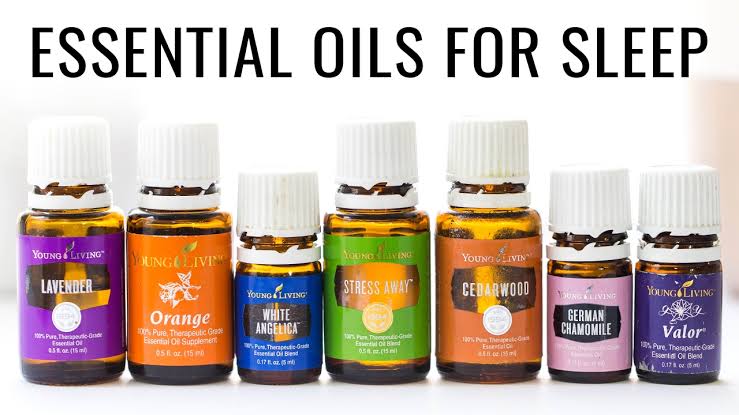6 sleep oils that help you sleep better and faster
Content:
Sleeping oils that you can use to sleep deeply and treat insomnia and fatigue If you suffer from insomnia or other sleep difficulties, essential oils such as lavender oil may provide some relief. Although scientists have not yet determined how or why aromatherapy can help alleviate sleep problems. However, it is believed that inhalation of essential oil particles (or absorption of essential oils through the skin). It may activate chemicals in the brain associated with sleep control.
To date, there is very limited scientific support for the effects of aromatherapy on sleep. However, preliminary research suggests that some essential oils may help promote relaxation. Thus, it encourages better sleep.
Essential oils that can help you sleep better: 1. Lavender oil:
Of course, no list of the best essential oils for sleep would be complete without lavender oil. It is one of the most famous natural sources of inducing a peaceful sleep. Lavender oil is safe to apply directly to the skin, but it is advised to test a small amount on your hands first before using it in larger amounts. Apply a few drops to your pulse points before bed or rub a little between your palms and inhale with deep breaths. Adding a few drops of lavender oil to your bath water is another great way to unwind after a long day.
Lavender oil is the most common type of essential oil used to promote better sleep. Lavender oil is also very beneficial when it comes to relieving sleep problems. For example, a 2015 study of 159 postpartum women found that eight weeks of lavender aromatherapy helped improve sleep quality in both mother and baby.
In another study, participants using lavender oil dropped four drops of 10 percent lavender oil (along with sesame oil) onto a cotton ball. Then I placed it on a cylindrical container, taking care to take 10 deep breaths from this container. Then he put the container next to their pillow until morning, and they continued doing this 4 times a week for eight weeks. The study showed that these people had better sleep than the other group that followed the same procedure, but only used sesame oil.
In another study published in Critical Care Nursing in 2017. 60 people with heart disease who were in the intensive care unit were given 2 percent lavender oil (for inhalation) for 15 days. This study showed the ability of lavender oil to improve sleep quality and reduce anxiety.
2. Cedarwood oil:
Cedarwood oil is one of the most popular essential oils for sleep. Cedar wood has a relaxing and perfect woody scent that helps you sleep better. Studies have shown that cedarwood oil is effective as a sedative and has been shown to reduce heart rate and blood pressure. Its benefits are not limited to being a sleep aid. But it is also useful in treating high blood pressure and getting rid of anxiety.
Cedrol, a component of cedar essential oil, has been found to be known for its sedative properties, and a study of 178 women showed that pupillary rating (the measurement of the diameter of the pupil used to reflect nervous system activity) increased after inhalation of cedarol, indicating that cedrol has an effect. sedative;
Another small study involving elderly people with dementia placed a mixture of essential oils (Japanese cypress, cedarwood, and pine) on towels around the participants’ pillows every night for 20 days. Sleeping periods are bigger and better than others.
3. Neroli oil:
The oil is extracted from the blossoms of the orange tree, and its spicy citric aroma makes it a common ingredient in perfumes. Studies have shown the ability of neroli oil to produce a calming effect, and it is characterized by its ability to promote better sleep, especially when combined with lavender and chamomile oil. It is also effective alone in reducing high blood pressure levels, especially in women.
4. Bergamot Oil:
In a study published in Complementary Therapies in Clinical Practice in 2016, researchers examined the use of essential oils (including a blend containing bergamot and sandalwood) in a personal aromatherapy device to improve sleep. After giving 65 participants these oils, the study showed that 64 percent of people participating in this study reported an improvement in sleep quality.
5. Ylang Ylang Oil:
From the flowers of the Kanja tree, native to Indonesia, ylang ylang flowers produce an oil that is effective in reducing high blood pressure due to its sedative effects. It can also help you fall asleep faster. A little bit of this oil can relieve stress and anxiety. Moreover, Ylang Ylang oil also has a wonderful, light floral scent that works great as a perfume or natural air freshener. .
6. Chamomile Oil:
Chamomile is one of the best known natural sedatives, which in turn makes it one of the most essential oils that promote better sleep. Whether you drink chamomile tea or inhale chamomile oil, the use of chamomile as a sedative has been documented for centuries and is one of the most popular ways to fight insomnia, studies have shown. Chamomile’s efficacy in relieving stress and anxiety, get a dose of aromatherapy by sprinkling a drop or two in steaming water and then inhaling 10 deep breaths.
How to use essential oils to help you sleep better:
There are many ways to use essential oils. One way is to massage your neck, shoulders, and any other areas with a relaxing essential oil mixture. You can also put a few drops of a sleep-enhancing essential oil on a cotton pad and place it on your pillow in the evening for an hour, or apply a few drops of essential oils. The booster is to sleep in your bathtub and sit inside for a few minutes and relax.
Some important tips to keep in mind when using essential oils: Some people experience an allergic reaction to essential oils, so it is advised to do an allergy test before using any new oil, since essential oils are very potent. You should always exercise caution when using aromatherapy, as You can mix an essential oil with a carrier oil (such as jojoba or sweet almond oil) before applying it to the skin. It is best not to apply it directly to the skin or use it in excessive amounts. Essential oils should never be taken internally without the supervision of a health professional. If you are pregnant or breastfeeding, Be sure to speak with your doctor before using essential oils. Learn more about using essential oils safely, and talk to your doctor if you have trouble sleeping or if you are considering using aromatherapy to treat a sleep disorder.


